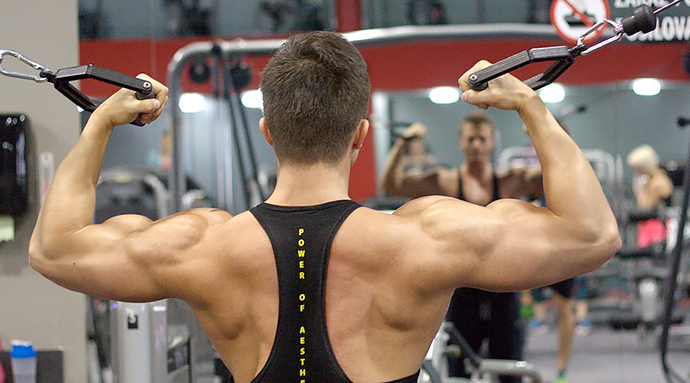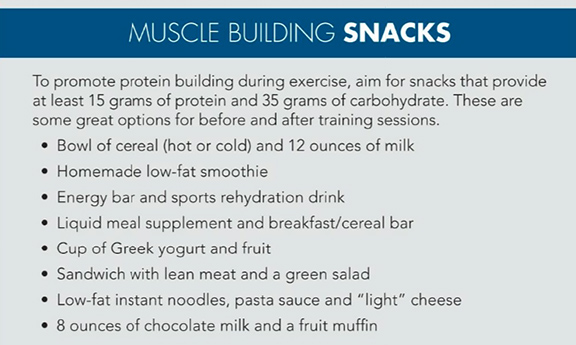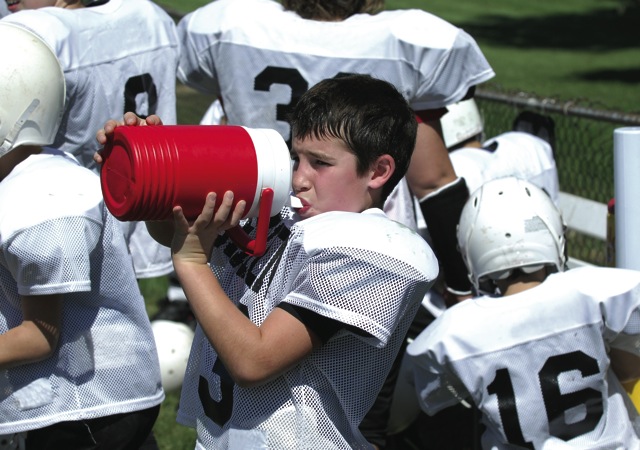Nutritional Value: Tips for gaining muscle mass

For many athletes, bulking up can play a key role in their personal development. In turn, it can directly influence a team’s overall success.
For most athletes, the intention to bulk up or gain weight is a desire to increase lean muscle mass and strength. Few athletes need or plan to increase body fat. To add weight that is predominately due to lean muscle mass requires that the athlete adhere to a strict formula. That means a well-designed strength training program, extra calories, adequate protein and sleep.Increasing calories
An increase in dietary energy intake, or total calories, is essential to gain significant muscle mass. In other words, an athlete needs to consume approximately 200 to 500 extra calories daily (on top of current daily energy needs) to add a pound of muscle.
This can be a real challenge for some athletes. Intense exercise can curb appetite, and frequent or prolonged training sessions can limit opportunities for meals and snacks. An increased reliance on energy-dense snacks and drinks is often necessary to overcome these obstacles.
Here are a few tips for increasing energy intake:
• Eat more often. Intestinal comfort improves when the frequency of meals is increased rather than increasing the size of existing meals. Eating frequently needs to become a priority, even during busy days. The goal is to consume three main meals and three or more snacks daily.
• Make it dense. Make use of energy dense drinks. That includes smoothies, powdered meal replacement formulas, fruit juices and sports drinks. Also consider nutritious, energy-rich foods like cereal, sports bars, instant oatmeal, dried fruits and mixed nuts.
» RELATED: Developing size, strength in young athletes
For extra protein and an energy boost, skim milk powder can be added to homemade milk drinks. Just 1/4 cup, or 4 tablespoons, adds 9 grams of protein and 90 calories. Energy-rich drinks, or “liquid meals,” can be particularly useful for athletes with smaller appetites, including those unable to tolerate solid food before or after exercise.
• Don’t fill up on fiber. Low-energy fruit and vegetables, although a great source of fiber and other nutrients, are best maintained at their current level. This allows more room in the athlete’s meal plan for higher-calorie, nutrient-rich options.
• Plan the day’s intake. Also plan what and when to eat. This is the only way to ensure that suitable foods and drinks are consistently available. Instruct athletes to keep a ready supply of non-perishable snacks with them throughout the day. Support them by ensuring refueling opportunities during and after practices or competition.
• Don’t fat-load. While an increase in calories is essential to promote gains in muscle mass, eating to gain muscle mass is not an excuse to indulge in high fat, high calorie, nutrient-poor convenience foods. For many athletes, this strategy only leads to gains in body fat that later must be reduced.
Adding protein
Resistance-trained athletes do require more protein — 0.8 to 1.0 grams of protein per pound of body weight.
The greater amount of food consumed by most athletes ensures a generous protein intake, usually above what’s required. The focus, therefore, must remain on increasing overall energy intake (calories), not just protein. For the majority of athletes, a specific protein supplement is not necessary.
Ongoing research indicates the timing of protein intake may be just as important as the total consumed daily. To create an optimal environment for gains in muscle mass, athletes need to include small servings of protein-rich foods at each meal and snack. This is important for anything eaten before and after a weight-training session.
Small amounts of protein and carbohydrate consumed before and after exercise further enhances the building of body proteins. The combination of protein and carbohydrate results in better adaptations than either alone.
Including these stimulates the production of muscle-building hormones. It also reduces muscle (protein) breakdown while supplying the amino acids required for muscle building. To fully benefit from early morning training sessions, instruct athletes to consume a pretraining snack.
Training and sleep
If gains in lean muscle mass are a priority, a muscle-building phase needs to be incorporated into the athlete’s yearly training program.
The offseason is an ideal time to prioritize muscle mass gains. Consistent strength training sessions can be emphasized while limiting additional fitness and conditioning sessions, which can sabotage weight gain attempts. Athletes need to enter intense training sessions well-fueled with adequate muscle glycogen from a carbohydrate-rich diet. This allows the body more time to use incoming nutrients to build new muscle rather than constantly repairing it.
Getting adequate sleep each night may be the most overlooked piece of a muscle-building program. Growth hormones are naturally released during sleep, and they’re a key factor in normal tissue recovery.
Also, a rested brain is a focused and motivated brain. This helps athletes stay committed to developing optimal levels of muscle mass and strength. For most, that will be a long-term process.
Suzanne Girard Eberle is a board-certified sports dietitian and the author of Endurance Sports Nutrition (third edition, 2014).
4 thoughts on “Nutritional Value: Tips for gaining muscle mass”
Leave a Reply
You must be logged in to post a comment.







Thanks for mentioning how you need to consume three big meals and three small ones a day in order to gain muscle. It is important to understand that sticking to a diet like this can help you achieve the fitness goals you have. Personally, I would also want to check with a nutritional coach in order to get the best nutritional advice you can get.
I like what you said about planning when and what to eat. My sister has been thinking about being more healthy about nutrition. It could be really helpful for her to get into a nutrition program from a professional.
I liked that you said that building muscle takes exercise and eating more calories. I would imagine that a professional trainer would know how to create a regimen that is specific to your needs. I would be sure to hire a professional trainer to help me build muscle.
That’s a really good point that sports nutrition needs to be adjusted to the athlete’s needs and their performance goals. My nephew is trying to get into college basketball. He should try working with a sports nutritionist to see if he can find the right balance.